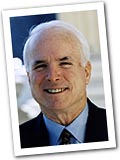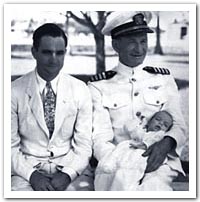John McCain: Maverick Nature

Engineering the "Straight Talk Express"
by Beth Rowen |
This article was posted on October 15, 1999.
 McCain is a three-term senator, Vietnam veteran, and straight-talker. "We could save $4 billion by not building the Sea Wolf submarine, another $4 billion by eliminating the pork-barrel items from defense appropriations."  McCain's memoir, Faith of My Fathers, touches upon the military careers of his father and grandfather. Related Links |
Information Please presents the seventh in a continuing series of Campaign 2000 profiles. Previous profiles have included Bill Bradley, George W. Bush, Hillary Rodham Clinton, Elizabeth Dole, Al Gore, and Pat Buchanan.
Maverick nature
John McCain, a three-term Senator from Arizona, mastered triangulation (a political term meaning to position oneself above and between Congress's party lines) long before Democratic strategist Dick Morris used the term to reinvent Bill Clinton in 1995. Yet McCain never used it as a campaign tactic; it's simply part of his maverick nature.
A longtime champion of campaign-finance reform (he co-sponsored with Democrat Russ Feingold a bill that would ban soft money), McCain has spoken out against pork barrel spending and isolationism (he favored ground troops in Kosovo). He voted in favor of an anti-tobacco bill, and recently steered clear of the Iowa straw poll.
On social issues, McCain is undeniably a conservative. He is anti-abortion, and favors teacher testing and school vouchers. He believes in small government and lower taxes. His reformist side appeals to moderate Republicans and Independents, yet his social conservatism is undeniably Republican in tone.
Bold and blunt
One of McCain's most striking—and uncandidate-like—qualities is his bluntness. He's currently criss-crossing the country in a tour bus called "Straight Talk Express." A veteran and former prisoner of war, McCain derides profligate spending on high-tech weapons systems. He thinks the military should turn its attention to enlistees and veterans.
"We're still buying a lot of equipment we don't need," he said at a campaign stop in New Hampshire. "We could save $4 billion by not building the Sea Wolf submarine, another $4 billion by eliminating the pork-barrel items from defense appropriations."
Although he voted for it, McCain calls the doomed Republican tax-cut bill a "meaningless charade."
Gaining on Bush
While he's trailing Republican frontrunner Gov. George W. Bush in both fundraising and public support, McCain seems to be gaining ground, much the way Bill Bradley is gaining on Vice President Al Gore. While Bush has been out raising money and boasting of his intellectual mediocrity, McCain has put forth thoughtful proposals on financing school choice, tax cuts, and campaign-finance reform.
Throughout the campaign, McCain courted veterans. In September, he stumped to this constituency while on a book tour for his memoir, Faith of My Fathers. The memoir chronicles the lives of his father and grandfather, both Navy admirals, in addition to his own.
But the veteran vote alone will not win him the Republican presidential nomination. He has yet to make a concerted effort to appeal to younger voters. As an alternative to the old-boy-network of the Bush machine, younger voters may gravitate to him for his frank discussion about his personal shortcomings—a refreshing departure from Clinton's denials.
Vietnam veteran, U.S. Senator
John S. McCain was born August 29, 1936 in the Panama Canal Zone into a family steeped in military history. At age 17, McCain enrolled in the U.S. Naval Academy at Annapolis. He graduated four years later, the fifth from the bottom of the class. As an ensign in the Navy he trained as an aircraft carrier pilot.
His service in Vietnam was nothing short of catastrophic. In July 1967, aboard the USS Forrestal, he narrowly escaped death when the aircraft carrier was accidentally hit by a missile and engulfed in flames. More than 130 men died in the accident. Only three months later, McCain set off for a bombing mission over Hanoi. His plane was hit by a missile, and he went down. He suffered two broken arms and a broken leg. He was snatched up by the North Vietnamese, who interned him in the "Hilton Hanoi."
McCain's father, Admiral Jack McCain, became commander of U.S. forces in the Pacific shortly after the younger McCain was taken prisoner. McCain's captors offered him early release as propaganda, but he refused and spent five-and-a-half years as a POW, two of them in solitary confinement.
After a long rehabilitation, McCain resumed his service with the Navy. He served as U.S. Navy Liaison Officer to the U.S. Senate from 1977 to 1980, and retired as a captain in 1981. He served two terms in the U.S. House of Representatives before being elected to the senate in 1986. He was re-elected in 1992 and 1998. Since 1997 he has been chairman of the Committee on Commerce, Science, and Transportation.
Not without his scandal
The decorated war hero has weathered his scandals, including his admitted infidelity which lead to the break-up of his first marriage. Senator McCain was also a member of the Keating Five, a group of five senators who worked behind the scenes on behalf of savings and loan operator Charles H. Keating, later convicted of fraud.
A vocal legislator, John McCain has worked to keep his temper in check. Nevertheless, he may be the one candidate in a crowded field of Republican presidential hopefuls to take seriously.
| Did you know? For more than a billion Muslims around the world, Ramadan is a "month of blessing" marked by prayer, fasting, and charity. |







